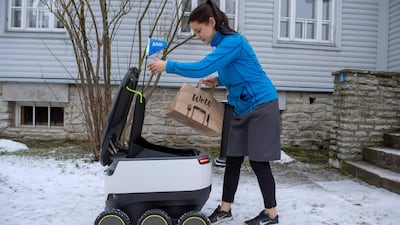Estonia, the country which helped create Skype and hosts Nato’s cyber-defence centre, is also trying to stay ahead of the pack in regulating robotics.
The economy ministry is working on legislation that would address the status of artificial intelligence in legal disputes, says Siim Sikkut, the official in charge of the government’s IT strategy. One proposal under consideration would create the term "robot-agent", which would be somewhere between having a separate legal personality and an object that is someone else’s property.
Driverless parcel delivery robots of Tallinn-based Starship Technologies, set up by Ahti Heinla, Starship's chief executive, and Janus Friis in 2014, were authorised by the Estonian parliament in June to move in traffic without human assistants at speeds up to 6kph.
Mr Sikkut says he sees advantages to elevating artificial intelligence to the same judicial level as natural and legal persons. In any case, the ministry first needs to amass enough political support to press ahead with the case.
“If we seize this opportunity as a government, we could be one of the trail blazers,” Mr Sikkut says in Tallinn.
While increased automation is presenting many countries around the world with regulatory issues, including rules for self-driving cars and drones, Estonia has been embracing new digital technologies at a faster clip than most others. The Baltic nation of 1.3 million has introduced paperless government, nationwide internet voting and remote access to Estonian digital infrastructure for foreigners, dubbed E-residency. Still, officials would like to make it easier for companies to use digital technologies.
Starship says its robot can deliver anything up to 10kg that can fit inside its delivery container such as parcels, groceries and food.
It is designed to deliver goods on the last mile of the delivery journey within suburban, residential areas. It can deliver within a 2 mile radius, the firm says.
"The robot can drive anywhere a pedestrian can walk but mainly sidewalks. It acts like a pedestrian. It merges with pedestrians, it matches pedestrian speeds," Starship says.
"The only place for the robot is on the sidewalks. It is much safer."
In response to claims that the robot revolution featuring machines such as Starships will inevitably lead to job losses - especially for deleivery drivers, the company is bullish: "Will this mean the end of the delivery driver? Definitely not. Delivery drivers are still the most efficient method for the first 10-100 miles of the transportation process. We think you will actually see a creation of jobs," it says, pointing out that the last mile of delivery is the regarded by many as the largest bottleneck in growth of the e-commerce industry.
______________
Read more:
Drones take bigger role in management of global power networks
Robot revolution does not faze the Scandinavians
______________
"We may even have delivery drivers picking up and dropping off robots in different neighbourhoods."
The user of a self-driving robot in Estonia is obligated to have liability insurance and the robot must be equipped with the user’s contact details.
Policymakers at the European Parliament adopted a resolution in February urging the European Commission to consider legislation and potential special status for robots, such as self-driving vehicles, to establish who is liable for damages they may potentially inflict.
Mr Sikkut says he is not aware of any government currently preparing a robotics law outside Estonia, adding that the new rules can hopefully be implemented “within a couple of years”.
Estonia still has many hurdles ahead. Giving robots personal rights and responsibilities "goes against Europe’s humanist history of law", notes Triniti, the law firm that prepared a legal analysis for the ministry on the issue.
“We need to get plenty of myths and stereotypes out of the way early on," Mr Sikkut says.
"Like that robots are taking over everything or that we’re going too far with computerisation. Of course, these questions need to be addressed with all new technologies.”

